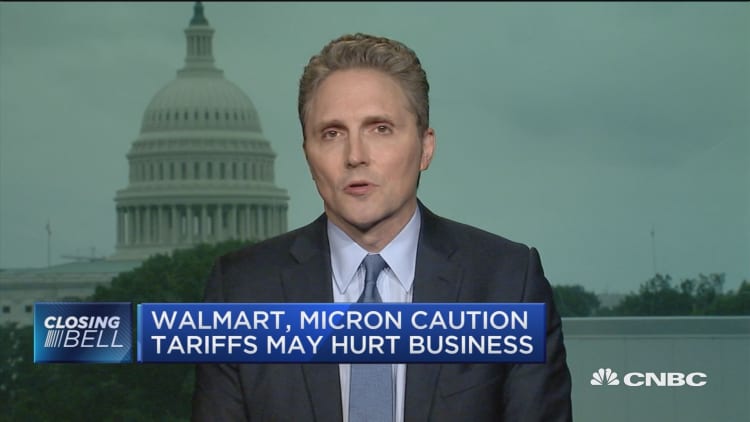The latest round of tariffs targeting U.S. and Chinese companies went into effect this week, and the market has so far maintained its highs.
But investment experts warn that you should not get lulled into a false sense of security.
While the tariffs levied on $200 billion worth of Chinese products are currently set at a rate of 10 percent, that could ramp up to 25 percent by the end of the year.
"The biggest question is do we get the 25 percent tariffs starting on Jan. 1 of next year," said Ed Mills, Washington policy analyst at Raymond James. "Ten percent gets absorbed in a number of different ways; 25 percent does not."
The staggered implementation is most likely a sign of the Trump administration's strategy rather than a softening of its stance, Mills said.
"It's better not to have a 25 percent tariff going into midterm elections and going into the holiday buying season," Mills said.
Once we get beyond the midterm election, if this is not resolved, it will be difficult to stop a potential trade fight, Mills said.

So far, the market is taking the developments in stride, but that could change, according to Ryan Detrick, senior market strategist at LPL Financial.
"You can get too comfortable with the fact that tariffs haven't done much to slow down the U.S.," Detrick said. "Should the back and forth with China take a nasty turn, that could catch people off guard potentially."
Tariffs will raise costs for companies, which will mean higher costs for consumers on a variety of goods.
It also means that some companies or sectors in your portfolio will be more susceptible.
Experts say now is the perfect time to do a portfolio check-up and trouble shoot for areas that could be more susceptible to the effects of these levies.
"This is legislative risk. This is risk related to rules and changes that are beyond our control," said certified financial planner Marguerita Cheng, CEO of Blue Ocean Global Wealth. "But we need to be prepared for it."
Watch your tech exposure
Technology is one area that could be hit particularly hard by tariffs.
That is because there are a lot of products built or manufactured in China, or where China is a large purchaser of products, according to Mills.
Areas that could be particularly susceptible include semiconductors, 5G communications, cell phones, artificial intelligence, robotics and biopharmaceuticals, he said.
One name that repeatedly comes up is Apple, Mills said, and how everything from product to sales could be affected.
Apple acknowledged the potential negative impact the tariffs could have on its business in a letter to the Office of U.S. Trade Representative earlier this month. The company did not, however, put an estimate on how much its costs would increase.

"If you believe in technology, you should still believe in it," Cheng said. "Just understand that it is going to be more volatile."
Also keep in mind that not all tech stocks are equal, Cheng said. Companies that are providing technology services may not be as vulnerable because they do not have products that will be affected by changing manufacturing rules, she said.
Reduce individual stock positions
If you do have a penchant for owning individual stocks of companies like Apple or other brand names, now could be a great time to scale back, said Diahann W. Lassus, CFP and president of Lassus Wherley.
In general, you want to make sure any ownership you have of a single stock is minimal, so that your portfolio does not take as big of a hit if tariffs or another news event cause one stock to plummet.
"A lot of times people accumulate stock from the company they work, and they might have high gains and then it's a very painful process to move out of it," Lassus said. "We try to recommend that people keep taking profits and using those funds to rebalance their portfolio."
Set a target for how much that stock should take up of your portfolio — say 10 percent to 6 percent — and rebalance if your ownership grows beyond that, Lassus said.
Know how your funds are allocated
Just like single stock investments in technology could be risky, funds that are specifically devoted to this sector could be susceptible to more volatility.
"If you have a sector ETF that you think could be significantly impacted by tariffs, it would be a really good time to evaluate that and potentially take your profits and move on," Lassus said.
Also be sure to look into the exact holdings of funds you own, suggested Cheng.
Investors may be tempted to run to commodities, where gold is often considered a safe haven. But a commodities fund could also own soybeans, an area that is susceptible to tariffs, Cheng said.
"It may not be appropriate just to run to commodities," Cheng said. "You have to make sure what kind of commodities you're looking at."
More from Personal Finance:
How the tariffs on China mean higher prices for American shoppers
Here's what that Fed rate hike means for your wallet
Looking to jump on the cannabis investing bandwagon? It's buyer beware
Consider potential safe havens
Investors who crave more security might want to add more treasury inflation protected securities to the bond side of your portfolio to protect from rising rates and inflation, Cheng said. Generally, holdings in TIPS should stay within the range of 3 percent to 5 percent, she said.
Small cap stocks, which are typically domestic in nature, may also mitigate the effects tariffs have on your portfolio, Detrick said.
"Should there be more protectionism with the tariffs that come in, small caps could be that area that could potentially benefit," Detrick said.
"At the same time, everyone is watching them," he said. "They know the small caps are that area that people are going to kind of hide out in. It absolutely could be more volatile from that point of view."
WATCH: Five strategies you should use to protect your portfolio



